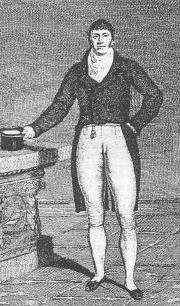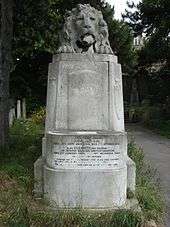John Jackson (boxer)
| John Jackson | |
|---|---|
 | |
| Born | 28 September 1769 |
| Died | 7 October 1845 (aged 76) |
| Resting place | Brompton Cemetery, London, England |
| Other names | "Gentleman" John Jackson |
| Occupation | Pugilist |
| Known for | Champion of England |
John Jackson (28 September 1769 – 7 October 1845) was a celebrated English pugilist of the late 18th century.
He won the title Champion of England in a fight on 15 April 1795 in which he beat Daniel Mendoza. After this he created a boxing academy for gentlemen at 13 Bond Street, London. Jackson's Saloon was popular with the nobility and gentry. Lord Byron relates in his diary that not only did he receive instruction in boxing from Jackson, but also had a homosexual fling with him.
Byron referred to Jackson as the 'Emperor of Pugilism', and the leading prizefight reporter, Pierce Egan, writing in Boxiana declared him to be the 'fixed star' of the 'Pugilistic Hemisphere'.[1]
In the artist Thomas Lawrence's 1797 exhibition at the Royal Academy, an enormous painting of Satan Summoning his Legions was based upon a giant portrait of Jackson. In 1814, Jackson helped to establish the 'Pugilistic Club'.[2]

Jackson is buried in Brompton Cemetery, London.[3]
In popular culture
Jackson features as a character in Rodney Stone, a Gothic mystery and boxing novel by Sir Arthur Conan Doyle.
He and/or his saloon are frequently mentioned in Georgette Heyer's Regency romances.
The characters of Jackson and Mendoza also have minor but important roles in the film The Young Mr. Pitt.